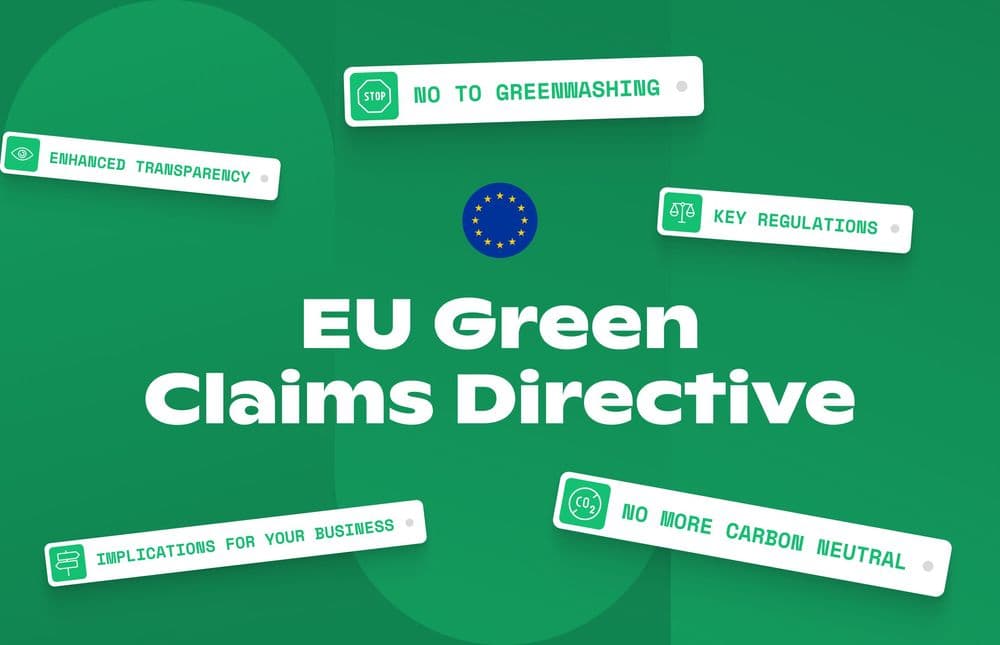In an era where environmental awareness is at its peak, the European Union has taken a decisive step towards a more sustainable future with the enactment of the EU Greenwashing Law. This groundbreaking regulation seeks to put an end to deceptive marketing and advertising generic environmental claims like “carbon neutral” or “eco”, ensuring that consumers and businesses alike are equipped with accurate information regarding product sustainability. Anticipated to be approved by Members of the European Parliament in November 2023, this law will have a profound impact on how businesses operate and market their products starting in 2026. Whether you're a vigilant consumer or a business committed to environmental responsibility, comprehending this law is of paramount importance in today's eco-conscious landscape.
1. Understanding the EU Greenwashing Law: It’s Significance and Impact
The proposed EU Greenwashing Law represents a legislative milestone aimed at curbing misleading environmental claims. Its core objective is to mandate transparent and accurate disclosures from businesses regarding the sustainability of their products. But why should this law matter to you? The answer lies in the fundamental importance of informed decision-making. Deceptive claims, such as "carbon neutral" or "carbon negative," often reliant on emissions offsetting schemes, can mislead consumers and significantly impact their choices. Moreover, businesses engaging in greenwashing practices risk damage to their reputation. The EU Greenwashing Law stands as a beacon of truth, guiding both consumers and businesses towards a more sustainable future. This comprehensive guide outlines essential steps for companies to ensure compliance with the EU's greenwashing regulations and foster transparency in their sustainability endeavors.
"We are clearing the chaos of environmental claims, which will now have to be substantiated, and claims based on emissions offsetting will be banned."

Biljana Borzan
EU lawmaker
2. Implications for Businesses: Potential Consequences of Greenwashing
The new regulations introduced by the European Union to combat greenwashing and enhance consumer information will have substantial implications for companies. Here are some of the potential consequences:
-
Reputation Damage: Businesses engaged in greenwashing may experience significant reputational harm, which can erode consumer trust and negatively impact profitability.
-
Legal Consequences: Non-compliance with greenwashing regulations can lead to legal actions, including fines, sanctions, or, in severe cases, suspension of business operations.
-
Increased Compliance Costs: Companies may need to allocate additional resources to ensure compliance with these regulations. This may involve hiring legal and sustainability experts or conducting third-party audits of their environmental claims.
-
Competitive Disadvantages: Companies failing to adhere to greenwashing regulations could find themselves at a competitive disadvantage, as consumers increasingly prioritize environmentally-friendly products and services.
3. Key Regulations of the EU Greenwashing Law
The EU Greenwashing Law includes a set of specific measures aimed at promoting transparency and accuracy in environmental claims. These measures are crucial for both businesses and consumers to understand:
-
Banning Generic Environmental Claims: The EU Greenwashing Law takes a firm stance against generic environmental claims such as "environmentally friendly" or "carbon neutral" when there is no substantiated proof of exceptional environmental performance. This prohibition safeguards consumers from false advertising and encourages businesses to back their claims with evidence. For consumers, it means making more informed choices based on reliable information.
-
Limiting Product Durability Claims: In a bid to enhance product longevity and reduce waste, the law prohibits marketing goods with design features intended to limit their durability without clear disclosure. This provision encourages responsible product design while promoting consumer trust. For businesses, it underscores the importance of crafting sustainable, durable products.
-
Certified Sustainability Labels: The EU Greenwashing Law recognizes the value of sustainability labels backed by approved certification schemes or established by public authorities. For businesses, seeking and displaying such labels becomes a mark of authenticity. For consumers, these labels offer a reliable guide for choosing sustainable products.
-
Visibility of Guarantee Information: To empower consumers, the law mandates more visible guarantee information. Many consumers are unaware of their rights regarding product guarantees, and this provision ensures they are well-informed. It also fosters transparency and builds consumer confidence in product quality.
-
Introduction of Guarantee Extension Label: A new feature introduced by the law is the guarantee extension label. This label prominently identifies products with extended guarantee periods, making it easier for consumers to select longer-lasting options. It's a win-win, promoting sustainability and consumer satisfaction. These specific measures are pivotal in ensuring that businesses provide accurate information about their products' environmental impact, helping consumers make informed choices and advancing the cause of sustainability.
4. Steps for Ensuring Compliance with the EU Greenwashing Law
To ensure compliance with the EU's greenwashing regulations and to avoid misleading consumers, companies should consider the following steps:
-
Review and Audit Marketing Materials: Conduct a comprehensive review of all marketing materials and environmental claims to ensure alignment with EU regulations. Seek input from legal and sustainability experts to identify potential areas of concern.
-
Substantiate Environmental Claims: Provide robust evidence to support environmental claims, utilizing credible and verifiable sources. This may involve scientific studies, third-party certifications, or government data. Be prepared to disclose this information as required by the regulations.
-
Rigorous Carbon Accounting: To demonstrate environmental impact, companies must support their claims with data. Utilize primary activity data, such as energy invoices and bills, to track scope 1 and 2 emissions. For scope 3 emissions, gather data and provide concrete evidence to substantiate claims.
-
Implement Standardized Environmental Labels: Consider adopting standardized environmental labels, such as the EU Ecolabel where applicable. These labels offer consumers reliable information about a product's environmental performance, demonstrating compliance with regulations.
-
Employee Training: Provide training to employees to ensure they understand the implications of greenwashing regulations. Equip relevant personnel with the knowledge to identify potential compliance issues.
-
Continuous Monitoring and Updates: Regularly review and update marketing materials and environmental claims to ensure ongoing compliance. Stay informed about new developments in sustainability research and changes in the regulatory landscape.
By following these steps, companies can navigate the evolving landscape of greenwashing regulations, build trust with consumers, and contribute to a more sustainable future while aligning with the goals of the EU's greenwashing laws.
Collaboration with Tree.ly
Explore a partnership with Tree.ly, a digital platform that connects forest owners with environmentally-conscious businesses. Tree.ly wholeheartedly embraces this new regulation as it aligns perfectly with our mission to promote voluntary contributions instead of allowing companies to simply purchase their sustainability credentials. This approach encourages companies to provide financial support for sustainable forestry practices, highlighting the tangible benefits of climate protection efforts rather than merely relying on the purchase of carbon certificates.
Read more about the transition to the “Contribution Model” on our Blog.
For inquiries or partnership opportunities, please don't hesitate to contact us. Your commitment to sustainability and transparency is highly valued.
Conclusion
The EU Greenwashing Law represents a significant step towards a greener, more transparent future. It underscores the importance of truthful environmental claims, durable products, and sustainability certification. Whether you are a consumer seeking authentic information or a business striving for sustainability, this law serves as a guiding light toward a more eco-conscious world.
If you continue to be interested in the topic of carbon related topics and climate protection, we recommend subscribing to our newsletter to stay updated on new developments regularly!
Note: Members of the European Parliament are anticipated to vote on this set of regulations in November 2023. If approved, member states will have a 24-month window to implement these rules into law, allowing them to come into effect by 2026.
Read Blogpost
4 Steps to Become a Climate Change Leader

contact us
We're here to help
















